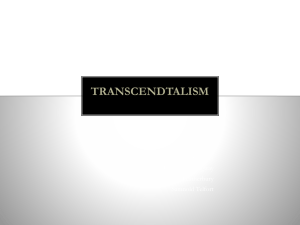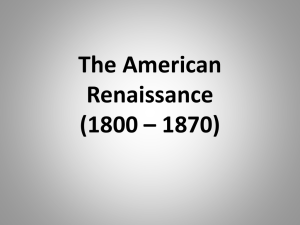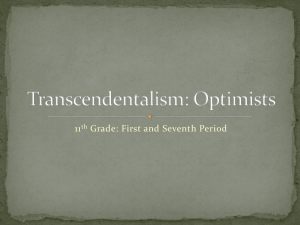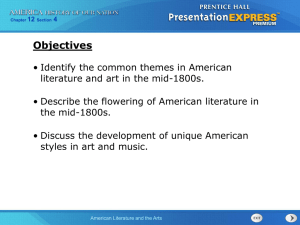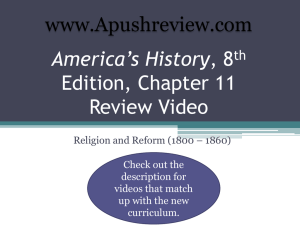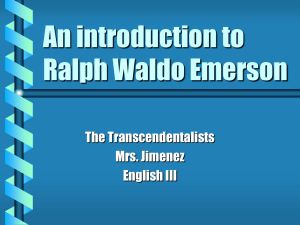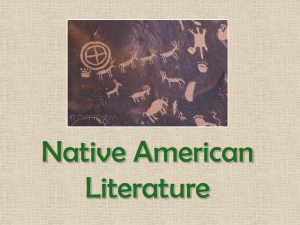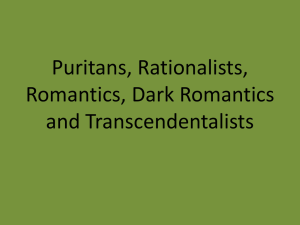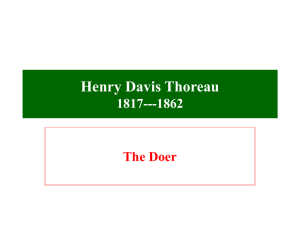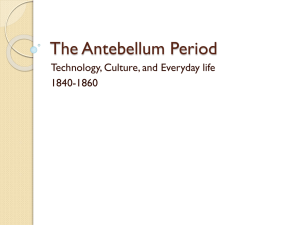Life (1803
advertisement
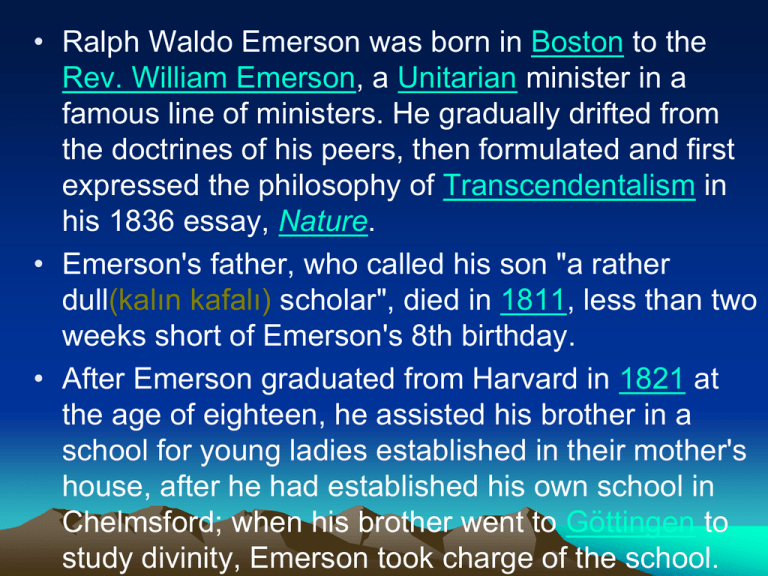
• Ralph Waldo Emerson was born in Boston to the Rev. William Emerson, a Unitarian minister in a famous line of ministers. He gradually drifted from the doctrines of his peers, then formulated and first expressed the philosophy of Transcendentalism in his 1836 essay, Nature. • Emerson's father, who called his son "a rather dull(kalın kafalı) scholar", died in 1811, less than two weeks short of Emerson's 8th birthday. • After Emerson graduated from Harvard in 1821 at the age of eighteen, he assisted his brother in a school for young ladies established in their mother's house, after he had established his own school in Chelmsford; when his brother went to Göttingen to study divinity, Emerson took charge of the school. Life (1803-1882) • The distinguished poet, essayist, and lecturer was born in Boston, Massachusetts. • As a child, he experienced illness, poverty, and the death of a parent. • His father, a Unitarian minister, died when Emerson was eight years old, and his mother struggled to raise five boys • . After graduating, Emerson taught several years at his brother's school for girls. • He returned to Harvard to study for the ministry and became a Unitarian minister in 1829. • His brief career as a minister was marred by religious doubt and by his wife's death in 1831 • . After traveling to Europe for a year, Emerson returned to the United States to devote himself to lecturing and writing. In 1835, he remarried and settled in Concord. • From 1836 through 1838 he served as Minister to the small Unitarian congregation in East Lexington Massachusetts, Follen Church Society. This was his last ministerial position. Literary career • In September 1835, Emerson and other like-minded intellectuals founded the Transcendental Club, which served as a center for the movement, but did not publish its journal The Dial, until July 1840. Emerson anonymously published his first essay, Nature, in September 1836. • In 1838 he was invited back to Divinity Hall, Harvard Divinity School, for the school's graduation address, which came to be known as his Divinity School Address. His remarks managed to outrage the establishment and shock the whole Protestant community at the time, as he proclaimed that while Jesus was a great man, he was not God. • At the time, such statements were rather unheard of. For this, he was denounced as an atheist, and a poisoner of young men's minds. Despite the roar of his critics, he made no reply, leaving it to others for his defense. He was not invited back to speak at Harvard for another 40 years, but by the mid-1880s his position had become standard Unitarian doctrine. What is transcendentalism? • A floor wax? a breath mint?Actually it is a philosophy.Here are the big three beliefs of the transcendentalism: 1:There is a direct connection or ‘correspondence’ between the universe and the individual soul.as a result nature is where it’s at. • Nature is the gospel of the new faith. ‘he wrote in his :divinity school adress. The sage of Concord: RALPH WALDO EMERSON ‘The only way to have a friend is to be one’ ‘To be great is to be misundertood’ ‘life only avails ,not the having lived’ ‘’that government is best which governs not at all’’ thoreau ‘The mass of the men lead lives of quiet desperation’’thoreau • 2:By contemplating objects in nature,people can transcend the world and discover union with the Over soul that unities us all:He said in ‘nature’ • 3:follow your own intuition and own beliefs,however divergent from the social norm they may be. • The transcendentalists were an equalopportunity groups.Not to worry;in the transcendentalists’ democracy of intellect,you could interpret the movement any way you wanted İmportant works: • Nature;did little to establish his literary reputation at first,at least in part because published it anonymously. • The American scholar:it was a call for american intellctuals to trust their individualty and act as a noble representatives to the world. • The divinity school adress:He declared that true religion resides wthin the individual ,not in Christianity or in the Church. • Self reliance:there is a time in every man’s education when he arrives at the conviction that envy is ignorance;that imitation is suicide. The least you need to know: • 1.Emerson is the key intellectual and philosphical voice of 19 th-century America • 2.Transcendentalism was a philosphical movement that began around 1840.It stressed individualsim ,intuition,nature,and self-reliance. • 3.In his ‘divinity school adress’he declared that true religion resides within the individual,not in Christianity or in the church. • Early in 1842, Emerson lost his first son, Waldo, to scarlet fever. Emerson wrote about his grief in two major works: the poem "Threnody", and the essay "Experience." In the same year, William James was born, and Emerson agreed to be his godfather. • Emerson associated with Nathaniel Hawthorne and Henry David Thoreau and often took walks with them in Concord. Emerson encouraged Thoreau's talent and early career. • The land on which Thoreau built his cabin on Walden Pond belonged to Emerson. While Thoreau was living at Walden, Emerson provided food and hired Thoreau to perform odd jobs. When Thoreau left Walden after two years' time, it was to live at the Emerson house while Emerson was away on a lecture tour. • Their close relationship fractured after Emerson gave Thoreau the poor advice to publish his first book, A Week on the Concord and Merrimack Rivers, without extensive drafts, and directed Thoreau to his own agent who made Thoreau split the price/risk of publishing. The book found few readers, and put Thoreau heavily into debt. • Emerson was noted as being a very abstract and difficult writer who nevertheless drew large crowds for his speeches. • The heart of Emerson's writing were his direct observations in his journals, which he started keeping as a teenager at Harvard. • The journals were elaborately indexed by Emerson. Emerson went back to his journals, his bank of experiences and ideas, and took out relevant passages, which were joined together in his dense, concentrated lectures. He later revised and polished his lectures for his essays and sermons. • Emerson was strongly influenced by his early reading of the French essayist Montaigne. From those compositions he took the conversational, subjective style and the loss of belief in a personal God. • He never read Kant's works, but, instead, relied on Coleridge's interpretation of the German Transcendental Idealist. This led to Emerson's non-traditional ideas of soul and God. Essential Bibliography on Emerson • Cavell, S., Emerson Transcendental Etudes. • Stanford: Stanford UP, 2003. This is a collection of all the essays written on Emerson by his most profound philosophical scholar. • Kateb, G., Emerson and Self-Reliance. Thousand Oaks: Sage Press, 1995. Emerson’s democratic individualism. • Richardson, R., Emerson: The Mind on Fire. Berkeley: U of California Press, 1995. The most up to date biography. And the author is extraordinarily careful about the textual origin of Emerson’s thinking. • Stack, G.J., Nietzsche and Emerson: An Elective Affinity. Athens: Ohio UP, 1992. Soressi, B., Ralph Waldo Emerson. Il pensiero e la solitudine. Roma: Armando, 2004. An introduction to Emerson’s philosophy through Cavell’s interpretations and from a European perspective. • Urbinati, N., Individualismo democratico. Emerson, Dewey e la cultura politica americana. Roma: Donzelli, 1997. Essays – – – – – – – – – – – Nature Representative Man History Self-Reliance Spiritual Laws Love Friendship Prudence Heroism Intellect Art Poetry o o o o o o o o o o o o o Alphonso of Castile Astræ Bacchus Berrying Blight Celestial Love Compensation Concord Hymn Days Dirge Dæmonic Love Fate Ode To Beauty Poetry o o o o o o o o o o o Song Of Nature Sphynx The Amulet The Apology The Bell The Day's Ration The Problem The Rhodora The Snow-Storm The World-Soul To-day Nature (1836) • In these years Emerson, who already in Paris is fascinated by the Jardin des plantes and the Musée des sciences, enthusiastically reads the theorist of sciences and astronomer Herschel, and writes natural history essays, essays on English literature, and biographies. • In 1836 comes out, anonymous, Nature, a little systematic treatise which is central in the landscape of American Transcendentalism, that is a philosophical current which in Emerson’s and Thoreau’s versions one can see as a sort of existentialism which has pragmatist as much as idealistic and prophetic ramifications. • Nature begins with an explicit critique of post-hegelian historicism and of every “retrospective” attitude; a critique that he will further develop in the following essays and which one can find – almost without consistent variations, in Nietzsche’s second Untimely Meditation. The American Scholar (1837) and Divinity School Address (1838) • These two essays are the fruit of years of fervid studies in education, in the philosophy of culture and in philosophical anthropology (concentrated into a consistent number of essays which perhaps would be worthwhile to reconsider). • The essay of 1837 is the elaboration of an homonymous conference held at Harvard and defined by O.W.Holmes as “our intellectual Declaration of Independence”. Readers and scholars of any sort are invited to build from the foundations a new authentically American culture, and to free themselves from the eagerness to imitate at any cost the European models. Moreover, it is suggested Gramscian ideal of a total, organic intellectual, one who can unite both thinking and acting. • The scholar must be – rather than a reader of books – an observer of reality, of even the most ordinary and humble everydayness. Representative Men (1850) • This collection of essays shows in a first instance, what could be the scope and goal of our knowing the works and the life of the “great men”: they are worth not so much in that they are exemplars we have to servilely imitate, but as they are stimulating figures because representative of the potential inside each human being: Plato will speak to the Plato that is in us, and analogously Shakespeare, and so on. One needs to put himself in dialogue with these voices, but he also needs to use them well, avoiding being subjected by their authoritative influence.

